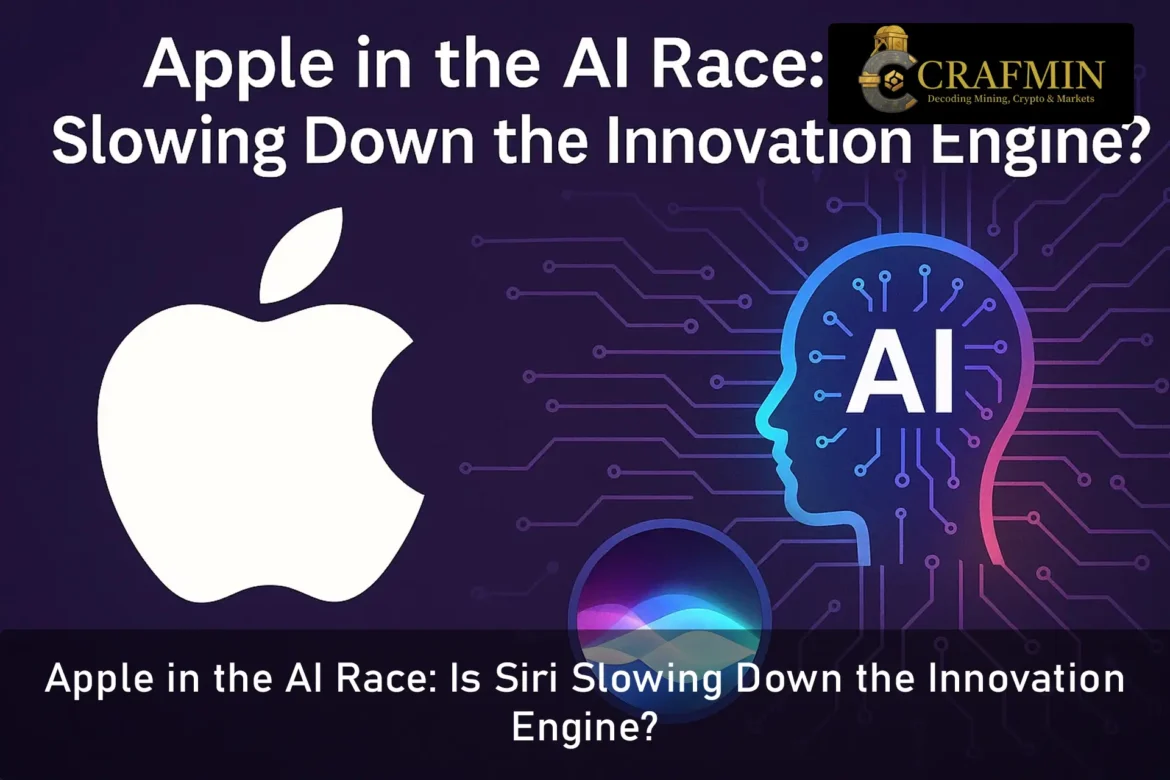Apple has long held its place at the forefront of consumer technology, setting the standard for design, usability, and privacy. But as the global artificial intelligence race accelerates, Apple now finds itself trailing — with Siri, its once-revolutionary voice assistant, becoming a focal point of criticism.

Is Siri Holding Apple Back in the Rapid AI Revolution? (Image Source: Gizmochina )
Siri’s Stagnation in a Rapid AI Revolution
In the early 2010s, Siri was a marvel — a futuristic voice interface that promised intuitive assistance. Fast forward to today, and Siri feels outdated. Unlike newer AI tools that offer fluid, context-aware conversations, Siri often struggles with even moderately complex tasks.
Meanwhile, the AI landscape has undergone a seismic shift. Tech giants like Google, Microsoft, and OpenAI have embraced generative AI, rolling out powerful tools that summarise content, write emails, generate code, and carry out contextual conversations. Siri, by contrast, remains limited in its abilities — a far cry from what modern users expect.
The Pressure of Expectations and the Cost of Caution
Apple’s brand has always stood for a blend of elegant functionality and user-centric design. But in the AI era, expectations have shifted dramatically. Voice assistants aren’t just novelties — they’re becoming essential interfaces. Consumers want tools that understand nuance, adapt quickly, and handle sophisticated tasks.
Internally, reports suggest Apple’s AI progress has been slowed by technical hurdles and cultural challenges. Its perfectionist ethos, combined with a strict commitment to privacy, has made rapid iteration difficult. While competitors release frequent updates, Apple has opted for slow, deliberate changes — a strategy that now seems misaligned with the speed of AI advancement.
Tech Rivals Are Racing Ahead
Microsoft has embedded OpenAI’s models across its suite of tools, from Office to Teams, enabling users to draft emails, create reports, and analyse data with conversational prompts. Google, with its Gemini model, is transforming Gmail, Android, and Search into AI-rich experiences. Meta is also rolling out smarter assistants across its social platforms.
Apple, in comparison, has made relatively modest progress. Siri updates have been mostly incremental — not revolutionary. For a company once known for redefining the future, this growing gap is raising eyebrows.
What’s Apple Planning Now?
The pressure is mounting, and Apple appears to be responding. Anticipation is high for this year’s Worldwide Developers Conference (WWDC), where Apple is expected to unveil a significant overhaul of Siri.
Speculation points to ongoing talks with OpenAI and Google to license their language models — a move that could dramatically boost Siri’s capabilities. Additionally, Apple is rumoured to be developing a “Private Cloud Compute” system, designed to securely support AI processing in the cloud without compromising user privacy.
This hybrid model — combining on-device intelligence with secure cloud-based computing — could give Apple a unique advantage in balancing power and privacy.
The Evolution of Voice Assistants
The role of voice assistants is changing. It’s no longer about setting timers or checking the weather. Today’s users want systems that can draft messages, analyse data, and provide real-time, intelligent interaction.
Apple still has the potential to redefine this space. If the company succeeds in rebuilding Siri into a true AI assistant, it could once again set the industry standard. But if it fails — or waits too long — it risks becoming irrelevant in a space it once pioneered.
An Inflection Point for Apple
This moment could represent a critical turning point for Apple. Hardware innovation alone is no longer enough. In a world where digital intelligence is the new frontier, Apple must deliver an AI experience that matches — or surpasses — its rivals.
Ironically, Siri helped introduce many users to AI. Yet today, it symbolises Apple’s lag in the field. The stakes are high. Apple’s next moves will reveal whether it can still shape the future or whether it has become too risk-averse to lead.
Also Read: AI Steps In to Revive Productivity in Australia
Why It Matters Beyond the Tech World
This isn’t just a debate for software engineers or AI researchers. It impacts everyday users. People want devices that anticipate their needs, simplify their work, and offer seamless interaction. Whether you’re managing a household, running a business, or diving into crypto and decentralised tech, smarter AI tools are becoming indispensable.
For privacy-conscious users, Apple’s upcoming AI strategy could be especially significant. If the company succeeds in building a secure, privacy-first generative AI framework, it could carve a distinct niche in an increasingly crowded market.
Apple’s Future Role in the AI Ecosystem
Can Apple still lead in AI? That depends on how fast — and how boldly — it acts. The company’s legacy of innovation has always relied on its willingness to challenge norms. To regain its footing, Apple must now embrace a new level of openness, agility, and risk.
Rebuilding Siri isn’t just a technical project. It’s a symbolic declaration: that Apple hasn’t lost its edge and can still surprise the world.
Conclusion: Can Apple Regain Its AI Crown?
Siri’s decline reflects more than a lagging product — it underscores the growing gap between Apple’s current output and the industry’s AI momentum. Whether through licensing deals, new infrastructure like Private Cloud Compute, or a complete redesign, Siri’s evolution will be a litmus test for Apple’s relevance in the AI era.
As the world shifts toward smarter, faster, more intuitive digital experiences, Apple’s next move will determine whether it still leads — or follows.

